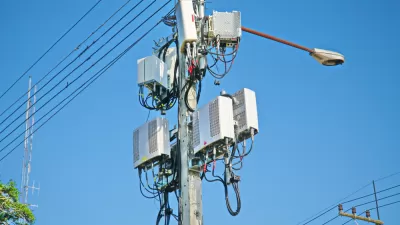Cezary Podkul and Emily Stephenson examine the likely economic and social consequences of efforts by the U.S. Postal Service to close thousands of rural post offices this year.
While officials blame the internet for killing the U.S. Postal Service, an examination of plans for post office closures reveals that "about one-third of the offices slated for closure fall in areas with limited or no wired broadband Internet."
Furthermore, "Nearly 80 percent of the 3,830 post offices under consideration are in sparsely populated rural areas where poverty rates are higher than the national average," and the post office serves as the only way to do business.
Although the Postal Service has chosen which offices to close based on revenue, "The statistics show that closing all the post offices under consideration would save about $295 million a year, about four-tenths of 1 percent of the Postal Service's annual expenses of $70 billion."
FULL STORY: Post office closings may increase rural isolation, economic disparity

Alabama: Trump Terminates Settlements for Black Communities Harmed By Raw Sewage
Trump deemed the landmark civil rights agreement “illegal DEI and environmental justice policy.”

Planetizen Federal Action Tracker
A weekly monitor of how Trump’s orders and actions are impacting planners and planning in America.

The 120 Year Old Tiny Home Villages That Sheltered San Francisco’s Earthquake Refugees
More than a century ago, San Francisco mobilized to house thousands of residents displaced by the 1906 earthquake. Could their strategy offer a model for the present?

Rural Population Grew Again in 2024
Americans continued to move to smaller towns and cities, resulting in a fourth straight year of growth in rural areas.

Safe Streets Grants: What to Know
This year’s round of Safe Streets for All grant criteria come with some changes.

Rural Missouri Transit Service Could Lose State Funding
OATS Transit offers low-cost rides to primarily elderly rural residents with little or no access to other transportation options.
Urban Design for Planners 1: Software Tools
This six-course series explores essential urban design concepts using open source software and equips planners with the tools they need to participate fully in the urban design process.
Planning for Universal Design
Learn the tools for implementing Universal Design in planning regulations.
Clanton & Associates, Inc.
Jessamine County Fiscal Court
Institute for Housing and Urban Development Studies (IHS)
City of Grandview
Harvard GSD Executive Education
Toledo-Lucas County Plan Commissions
Salt Lake City
NYU Wagner Graduate School of Public Service




























